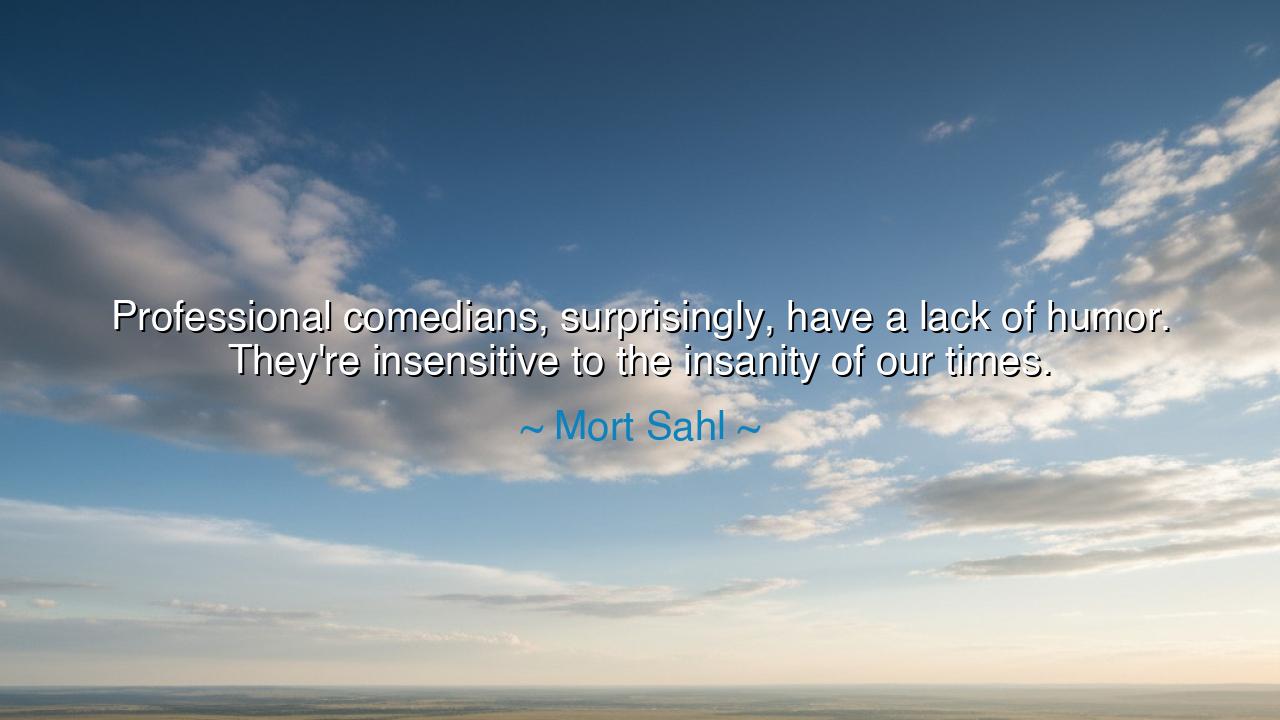
Professional comedians, surprisingly, have a lack of humor.
Professional comedians, surprisingly, have a lack of humor. They're insensitive to the insanity of our times.






The words “Professional comedians, surprisingly, have a lack of humor. They’re insensitive to the insanity of our times” by Mort Sahl are both a critique and a prophecy — a reflection of how the sacred art of laughter can lose its soul when it becomes a trade rather than a truth. In this single sentence, Sahl, one of the great pioneers of modern stand-up comedy, exposes a deep paradox: that those who are tasked with making others laugh may themselves forget how to feel the absurdity of life. To him, humor is not performance — it is perception. It is the sacred ability to see madness in the ordinary, to witness chaos and reveal it through wit. But when humor becomes routine, mechanical, or divorced from empathy, it ceases to enlighten and begins to wither.
Sahl himself lived in an age of upheaval — the Cold War, the rise of television, and the shifting moral fabric of the twentieth century. He was known not for slapstick or empty jokes, but for using comedy as a weapon of truth. His humor dissected politics, hypocrisy, and human folly. Yet, in this quote, he laments that too many who call themselves comedians have become blind to the very “insanity of our times.” He saw that some laughed only to entertain, not to awaken. True humor, he believed, should be a mirror held up to society — sharp, revealing, compassionate, and brave. To lose that sensitivity, that awareness, is to lose the essence of comedy itself.
In the ancient world, the fool or the jester was not merely an entertainer but a truth-teller. The kings of old kept jesters not to make them laugh idly, but to remind them of their humanity. Beneath the laughter, there was wisdom; beneath the jest, a blade of honesty. When the fool could no longer see truth, when he became intoxicated with applause, he ceased to serve his purpose. This is the warning that echoes in Mort Sahl’s words: when humor no longer seeks truth, it becomes hollow. To be “insensitive to the insanity of our times” is to fall asleep while the world burns — to joke about the surface while ignoring the storm beneath.
Consider the story of Charlie Chaplin, who understood this truth profoundly. During the chaos of the 1930s, as fascism spread through Europe, Chaplin created The Great Dictator. Beneath its comedy lay rage, sorrow, and moral courage. Chaplin’s laughter was not blind; it was prophetic. He mocked tyranny not to provoke giggles, but to awaken conscience. His humor had heart. In contrast, Sahl’s critique reminds us that many modern comedians — and by extension, many artists — lose this sacred balance. They may speak much but say little, laugh loudly but feel nothing. They have forgotten that the purpose of laughter is not only to amuse, but to heal, to reveal, to unite.
Humor, in its purest form, arises from sensitivity — from noticing the subtle, from understanding the tragic, from caring deeply about the world’s absurdities. It is born not of arrogance, but of empathy. The truly humorous soul laughs with humanity, not at it. When Sahl accuses comedians of lacking humor, he means they have lost touch with this empathy — the heartbeat of all great comedy. For humor without sensitivity becomes cruelty, and laughter without awareness becomes noise. The wise laugh not because they mock the world, but because they see through it and still choose to love it.
The lesson, then, extends beyond comedians to all people: do not become numb to the insanity of your times. When outrage becomes habit, when cruelty becomes normal, when absurdity becomes accepted, the soul begins to harden. We lose the ability to laugh with compassion and to cry with understanding. True humor requires the courage to see the madness clearly and still find light within it. It is not the laughter of escape, but of endurance — the kind that says, “Even here, even now, we remain human.”
So, my friends, let us take Mort Sahl’s words as a challenge. Keep your humor alive, not as a tool for mockery, but as a discipline of perception. Laugh not because life is easy, but because you refuse to surrender to its cruelty. See the world as it is — mad, wondrous, tragic, beautiful — and let your laughter be both shield and sword. For the day we stop feeling the absurdity around us is the day we stop being awake. And though the world may tremble with chaos, remember: the soul that can still laugh with compassion has not yet been conquered.






AAdministratorAdministrator
Welcome, honored guests. Please leave a comment, we will respond soon